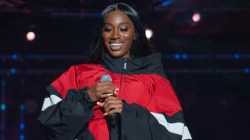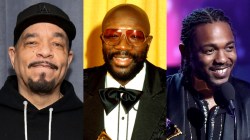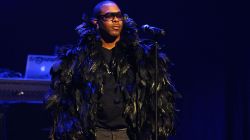“Unemployment ain’t rewarding / They might as well teach us extortion / The principal is like a warden / And the four-year sentence / Mad niggas never finish / But that doesn’t mean I couldn’t be a doctor or a dentist…” –M1, “They Schools” by dead prez.
America’s relationships with both higher education and with Hip Hop have always been intriguing, even if a bit hypocritical in both instances. For the longest time, it’s been part of the American dream to attain some sort of continued learning to improve one’s life. And for the longest time, Hip Hop as a whole, to some degree, had been vilified, shunned and looked down upon as music that was not even worthy of being called art in many circles. I mean, seriously, let’s not sugarcoat it or try to put a politically correct smiley face on the truth. That’s just how the chips have fallen.
But in recent years, the two relationships have almost switched sides, so to speak. Today, higher education is still seen as both a way in for some populations and a way out for others. But the fact that the cost of a good, quality education continues to rise and is being put out of reach of those that really need it is causing somewhat of a backlash to the U.S. educational system. Ironically, this also seems to be one of the main points of Occupy Wall Street, a movement that has gained some notoriety within the Hip Hop community for its D.I.Y. attitude and rebellious nature. Sound familiar? While on the other hand, Hip Hop has entered and been welcomed into mainstream pop culture with open arms after years, and even decades, of being pegged as a scapegoat for American society’s ills.
But more interesting than both of these phenomena by themselves is that, in just the last few years alone, Hip Hop music and higher education have met in a head-on collision of sorts. More specifically, curriculum that pertains to Hip Hop’s music, culture, and politics has infiltrated some of the country’s most prestigious institutions of higher learning: Harvard University, New York University, Duke University, Georgetown University, Rice University, Howard University and many, many more.

AD LOADING...
In reality, Hip Hop and higher education have a long history together. From one of the very first courses on Hip Hop offered at an institution of higher learning in the form of “History 98: The Poetry and History of Tupac Shakur” at the University of California at Berkeley in 1997, to books and studies used as required text at the college level. Works such as Tricia Rose’s The Hip Hop Wars, Nelson George’s Hip Hop America, Jeff Chang’s Can’t Stop Won’t Stop: A History of the Hip Hop Generation and Total Chaos: The Art and Aesthetics of Hip Hop quickly come to mind. But there are also examples of emcees serving as guest lectures at prominent schools (KRS-One at Temple University, GZA at Harvard University) and respected public figures and cultural critics including Jeff Johnson and Kevin Powell serving as guest speakers on wide-ranging topics of Hip Hop at universities nationally. Hip Hop found its way to the head of the class a long time ago.
The Influence of School Daze, “A Different World” And HBCUs
And this explosion of Hip Hop in the classroom setting can be drawn back to two main elements: the environment of Historically Black Colleges and Universities (HBCUs) in the late 1980’s and early 1990’s, and simultaneously, the popularity of both Spike Lee’s School Daze and the hit NBC sitcom, “A Different World.” Consider these factors: HBCUs have long been vestiges of music, culture and lifestyle for African Americans. And with the advent of Hip Hop, these institutions were bound to see the culture stake its claim on their campuses. What’s more, both School Daze and “A Different World” were the most authentic and accurate portrayals of life at HBCUs at the time (and arguably still are) in terms of fashion, slang, current events, politics and issues facing black students at the university level. And, of course, it would be remiss to not mention guest appearances on “A Different World” by Hip Hop artists and icons including Heavy D, Kris Kross and Tupac Shakur, which added to the show’s authenticity and street cred.
And there’s proof in the numbers, too. According to a 2010 New York Times report by Philander Smith College President Dr. Walter Kimbrough, during the heyday of both School Daze and “A Different World,” “black colleges reached a degree of prominence and visibility in the media that would, in turn, fuel rapid growth.” There was an increase in enrollment at HBCUs during the late 1980’s and early 1990’s that totaled nearly 25%. Four years after “A Different World” went off the air came the aforementioned University of California at Berkley course on 2Pac. From then on, we could safely say hello to Hip Hop being a major staple in the classrooms of colleges and universities throughout the country.

AD LOADING...
However, what’s most engaging is that Hip Hop in higher education is not just confined to the standard classroom setting or regular coursework. There are a plethora of conferences, symposiums and organizations formed that reach far beyond just textbooks and term papers. For example, since its 2006 formation at Virginia Commonwealth University in Richmond, VA, the Student Hip Hop Organization (SHHO) has grown to include chapters at eight universities in the Virginia area and beyond. The SHHO operates with the stated purpose of cultivating both the Hip Hop music scene in Virginia, as well as minds on the campuses of these institutions and creating opportunities for the sustainability of creative platforms for students to gain experience and follow their musical passions.
Mutual Appreciation Between Hip Hop And Academia
“The lecture is conducted from the mic into your speakers / Who gets weaker / The king or the teacher / It’s not about a salary / It’s all about reality / Teachers teach and do the world good / Kings just rule and most are never understood…” –KRS-One, “My Philosophy.”
Of course, Hip Hop has managed to take its message and its history well beyond just one school, region or organization. In the past five years alone, there have been a ton of examples of just how important Hip Hop has become to the concept of higher learning. One of the greatest examples comes from producer 9th Wonder. The North Carolina native has built up quite a resume for himself in the field of academia by teaching and contributing to courses ranging from African American Studies to Hip Hop History at both North Carolina Central University and Duke University. This past November, 9th Wonder was even part of a lecture at Harvard University, where he spoke exclusively on his role in contemporary Hip Hop music, as well as how Hip Hop music of the past has influenced him and his fellow current artists and producers.

AD LOADING...
Houston emcee and UGK co-founder Bun B began his term as a Distinguished Lecturer at Rice University earlier this year alongside Dr. Anthony Pinn, as part of Houston and Rice’s HERE (Houston Enriches Rice’s Education) project. Specifically, Bun co-teaches courses that deal with Hip Hop as a culture and how it relates to religion and religious beliefs. In a recent interview with Red Bull USA, Bun said that he learned a lot from his experience as an educator at the highest level.
“The first thing I learned, and many of us often talk about it, is that we don’t give educators in this country enough credit,” Bun stated in an interview with Red Bull USA. “I never really understood exactly what went into preparing a course, preparing lectures. Keep in mind, I’m doing this on a collegiate level where people are spending a lot of money to get this education, so these are people that want to learn. I couldn’t imagine being a teacher in the public school system where a lot of kids don’t even want to learn and having to deal with them for an entire day, five days a week.”
Cultural critic, author, professor and ordained minister Michael Eric Dyson has been coined by many as the “Hip Hop Professor,” with his many essays and books on subjects and figures in Hip Hop (Know What I Mean: Reflections on Hip Hop, Holler if You Hear Me: Searching for Tupac Shakur, Born to Use Mics: Reading Nas’s Illmatic). Dyson recently introduced a new course at the prestigious Georgetown University entitled “Sociology of Hip Hop: Theodicy of Jay-Z.”
“This class is about the politics, the culture, the racial dimensions, the class dimensions, the economic dimensions of Hip Hop culture seen through a figure like Jay-Z,” Dyson said in an interview with The Washington Post. “This is not a class meant to sit around and go, ‘Oh man, those lyrics were dope.’ We’re dealing with everything that’s important in a sociology class: race, gender, ethnicity, class, economic inequality, [and] social injustice…His body of work has proved to be powerful, effective and influential. And it’s time to wrestle with it.”

AD LOADING...
What all of the former proves is that Hip Hop, as an art form and a movement, has been affected by, and simultaneously has had a major impact on, so many aspects throughout American society. So much so that it’s almost obvious that it would be studied extensively by the brightest and best. From the current state of popular culture, to the political process and getting out the vote, to issues of gender equality and inequality, male/female relationships, feminism and sexuality, to business, entrepreneurship, ownership and wealth, some aspect of Hip Hop can be found within each of these topics.
Therefore, when we take all of this and more into consideration, Hip Hop was bound to find its way into the classrooms of prestigious institutions and universities. Like any other significant American cultural moment that came before or after it, Hip Hop’s move into the classroom was both inevitable and necessary.
More importantly, during the time of its infancy and eventual growth, Hip Hop was something that had not been seen or experienced before. And because of that, it has gained a creative, sociological, cultural, societal and political place in history that deserves to be studied and dissected for years down the line by some of the greatest minds in the world.
As Hip Hop’s influence and power continues to grow and expand, it will only cause greater opportunities for the study of the music, the culture and the history and the business aspects in the future. There exist a myriad of topics that may not have yet to be even touched on, let alone studied at length, at the university level, from the influence of Hip Hop internationally, to how to become a successful indie Hip Hop artist, to the growth of Hip Hop journalism in the last 20-plus years. See what I mean? We’ve only scratched the surface as far as Hip Hop in higher education is concerned.

AD LOADING...
Class is in session.
Ron Grant is a freelance writer originally from Detroit and currently residing in Orlando. He is a senior contributor to BrooklynBodega.com and runs two independent music blogs. Follow him on Twitter @RonGreezy.



